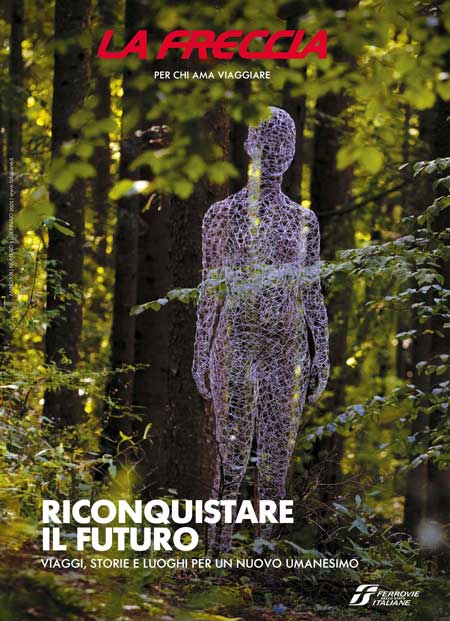La Freccia: en route to a new Humanism
Recapturing the future: the first cover of 2021 features a work by artist Cédric Le Borgne, with the person in his natural environment at the centre
Rome, 4 January 2021

A new Humanism that focuses on the individual and their legitimate pursuit of happiness. In the first issue of 2021, La Freccia looks to the future, with the front cover showing a female figure taking shape and coming to life in the middle of a forest, in a work by artist Cédric Le Borgne. A future capable of including diversity, enhancing the abilities and riches of our country, finding a balance between man and the environment. Here is the art that sees the territory be reborn, offered up as part of a novel tour through hidden cities – from Trentino to Sardinia – that become open-air galleries, all to be discovered (or rediscovered) just as soon as it is possible to do so.
The journey then continues from Introd to Roccamandolfi to explore the five small must-see inland resorts, awarded the Touring Club’s orange flags. In addition, there is a look at the places in which widespread hospitality offers the opportunity to come into contact with a hidden Italy, one that welcomes travellers who are able to forget about the Wi-Fi connection. Last but not least, delve into the 24 Tuscan villages that – thanks to community cooperatives – have returned to life with a model of social and economic innovation for the development of the territory.
Stay in Tuscany to cover a 130-kilometre loop between Siena and Grosseto, to reach the foot of the Amiata, a mountain with a strong spiritual and naturalistic appeal. The mountain is also the protagonist of a journey through the flavours of Trentino-Alto Adige: strudel, flour to sift and medicinal herbs. A way to unplug at high altitude.
Peppone Calabrese’s Genius Loci column takes us through the Umbrian hills in search of Solomeo, where entrepreneur Brunello Cucinelli realised the dream of a humanistic capitalism.
With 2021, the magazine inaugurates a new column dedicated to the themes of inclusion and diversity. It opens with the Italian Caritas and its projects of economic support, offering housing and psychological assistance conducted in response to the social emergency caused by the pandemic. Also interesting is the look at the non-profit association Sloweb, which promotes a conscious use of digital with training courses, podcasts and conferences. And then, face-to-face with Iaia Pedemonte, founder of the Gender Responsible Tourism association, which unites business entrepreneurs and travellers.
There is no shortage of exploring the sustainable future. The pandemic accelerated changes that seemed impossible, including technological innovation, electronic payments, sustainable transportation and the use of two-wheelers. Tomorrow must aim towards redesigning cities, re-evaluating villages and focusing on cultural heritage, rethinking an idea of tourism able to revive the country. A sustainable future that also moves towards changes in urban spaces, according to architect Stefano Boeri: greener metropolises to rediscover life in neighbourhoods and offices as places of socialisation.
Culture and the world of work represented by three women protagonists: Antonella Polimeni, the new Dean of the Sapienza University of Rome, focusing on inclusion, attention to students and participatory work; Francesca Moraci, Professor of urban planning and member of FS Italiane’s Board of Directors, committed to promoting female talent; Monique Veaute, Director of the Festival dei 2Mondi di Spoleto, who faces the restart with optimism.
Many other big names were also interviewed, with songwriter and co-founder of Subsonica, Samuel, who presents the album Brigata Bianca, the composer of soundtracks and performer Marco Guazzone, along with conductor Carlo Conti, at the helm of Affari tuoi (Viva gli sposi) on the RaiUno station, as well as team director and skipper Massimiliano Sirena, ready to compete with Luna Rossa Prada Pirelli in Auckland to clinch the Prada Cup. There are also the actors Giovanni Scifoni and Andrea Pennacchi, with the prior revealing his commitment to a series about Leonardo, as he waits to return to his role in the TV series Doc, whilst the latter talks about his relationship with theatre.
As always, in the first issue of the year, we look at the main events of 2020 through the most representative photographs of the iconographic volume of the Agenzia Nazionale Stampa Associata (ANSA - the National Associated Press Agency).
Medialogando, the column dedicated to the world of information, meets Massimo Martinelli, Director of Il Messaggero, with a focus on journalism at the service of the reader. Finally, the column Un treno di libri (A Train of Books) recommends reading The Book of Longings by Sue Monk Kidd, the story of a young and audacious woman’s bold struggle to have her voice heard.
The January La Freccia can be browsed and read in digital format, on FSnews, and on paper in the FRECCIALounge and FRECCIAClub, each copy cellophaned and personal, for readers to pick up and take away. The contents of FS Italiane’s monthly magazine are also available on the FSNews Telegram channel and the @fsnews_it and @LaFreccia_Mag Twitter profiles.